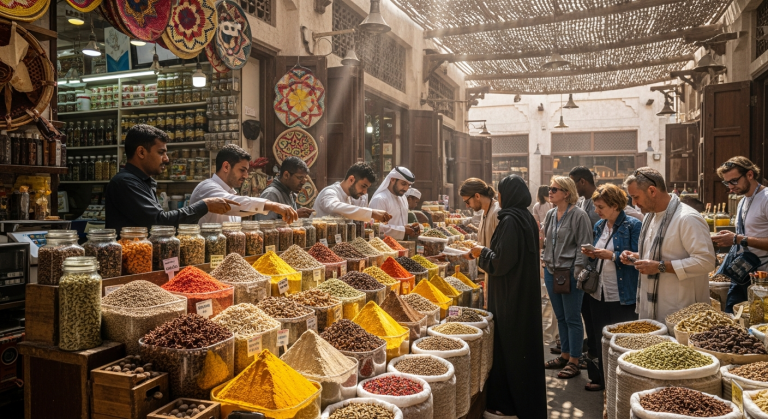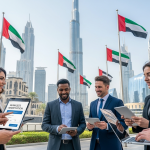Market Analysis and Opportunities
The United Arab Emirates, and particularly Dubai, represents a fertile ground for organic spice import and sales. With its burgeoning population, multicultural demographics, and position as a global trading hub, Dubai’s appetite for high-quality, organic food products is experiencing strong growth. According to Mordor Intelligence, the organic food market in the UAE is projected to grow at a CAGR of more than 13% between 2024 and 2029, reflecting rising consumer consciousness regarding health and sustainability. Spices, ingrained in regional and international cuisines, are a staple with robust year-round demand.
Target Market Analysis
- Estimated Market Size: The UAE’s food and beverage sector exceeded AED 71 billion in 2023 (Dubai Chamber of Commerce), with organic food making up a growing share.
- Consumer Preferences: Increasing health awareness, rising disposable incomes, and a large expatriate population drive demand for clean-label, organic products—particularly among millennials, families, and hospitality sectors.
- Purchasing Patterns: Urban consumers prefer premium, value-added, and traceable products. Premium supermarkets, gourmet restaurants, and e-commerce platforms are key sales channels. There is a growing online demand for specialty and wellness products, including organic spices.
- Industry Trends: Adoption of sustainability, digital transformation (including e-commerce integration), and emphasis on product traceability and provenance reflect evolving market expectations.
Marketing Needs
- Market Research: Understanding social, cultural, and religious preferences in the UAE is critical. Frequent use of market surveys, focus groups, and digital analytics is recommended.
- Digital Campaigns: SEO, pay-per-click (PPC), and targeted social media (Instagram, Facebook, TikTok) bolster brand reach among health-conscious and expatriate demographics.
- Branding Strategies: Development of a premium, authentic, and sustainable brand identity will resonate with Dubai’s quality-driven consumers, especially with certifications (USDA Organic, EU Organic) highlighted.
Expansion Potential
- Market Entry: Strategic partnerships with gourmet retailers, restaurants, and online marketplaces can accelerate penetration in Dubai and Abu Dhabi.
- Scaling Operations: Opportunities to expand into the GCC (Kuwait, Qatar, Saudi Arabia) via export or franchise models exist, leveraging Dubai’s logistics infrastructure.
- Diversification: Potential to offer B2B (hotels, caterers, food manufacturers) and B2C (retail, e-commerce) services, as well as premium blends or value-added products (e.g., organic spice kits).
Comprehensive Business Overview
Organic spice import and sales operate within the specialized food import-distribution industry, focusing on sourcing high-quality, certified organic spices for UAE consumers and businesses. The business model typically involves:
- Importing certified organic spices from producing countries (India, Sri Lanka, Ethiopia, etc.)
- Partnering with customs brokers and logistics providers for efficient UAE clearance
- Supplying retail stores, horeca (hotels, restaurants, catering), and e-commerce platforms
- Offering private label, bulk, or package sizes to suit diverse clients
Mission: To enrich the culinary experience in Dubai and the UAE with premium, sustainable, and ethically sourced organic spices.
Vision: To become the leading supplier of organic spices in the GCC, known for quality, transparency, and social responsibility.
Core Objectives:
- Establish and grow distribution networks in the UAE and GCC
- Educate consumers on the benefits of organic spices
- Promote fair-trade and sustainable sourcing
Business Stage: A typical new entry would begin as a startup, often based in Dubai’s Free Zones (e.g., Dubai Multi Commodities Centre) for ease of trade, 100% foreign ownership, and tax benefits.
Competitive Advantage
Entrepreneur Perspective
- Viability: High demand and premium pricing for organic products support healthy margins.
- Ease of Setup: Free Zones offer streamlined licensing and customs processes.
- Access: Dubai’s world-class logistics hubs (Jebel Ali Port, Dubai International Airport) enable reliable import and rapid distribution.
Investor Perspective
- Attractiveness: Strong market growth, rising organic food demand, and Dubai’s status as a global trading gateway ensure robust ROI potential.
- Scalability: The business can expand into new markets or product lines, increasing asset value and future exit options.
- Barriers to Entry: Building exclusive partnerships with suppliers or retailers, securing organic certifications, and leveraging supply chain efficiencies create sustainable competitive advantages.
Manager Perspective
- Operational Strengths: Established processes, technology integration (inventory management, ERP), and experienced sourcing partners ensure consistent supply and quality.
- Strategic Partnerships: Alliances with logistics companies, local distributors, and premium retailers create synergies and operational resilience.
Financial and Investment Needs
Financial Requirements
- Setup: AED 150,000–400,000 for company formation, licensing, and initial imports
- Marketing: AED 80,000–150,000 for launch campaigns, digital presence, and initial promotions
- Operations: AED 30,000–50,000 per month for warehousing, staffing, logistics, and working capital
Investment Potential
- Scalability: Opportunity to add new distribution verticals (B2C/D2C e-commerce, B2B institutional sales)
- Return on Investment: Premium pricing and high-value partnerships yield healthy margins with a payback period potentially under 24 months.
- Investment Models: Equity, convertible loans, or strategic partnerships are ideal for startups; mature businesses may consider venture capital or private equity for scaling.
Financial Risks
- Cash Flow: Delayed receivables can strain liquidity—implement strict credit controls.
- Currency Fluctuations: Import reliance exposes business to exchange rate shifts—hedging strategies and multi-currency bank accounts recommended.
- Setup Costs: Initial outlay can be sizable; consider phased investments and government incentives.
Human Resources and Recruitment
Workforce Needs
- Employees: 1–2 import/export specialists, 2–5 sales personnel, 1–2 digital marketers or e-commerce managers
- Skills: Procurement, international logistics, digital marketing, sales, and food safety compliance are critical
HR Challenges
- Talent Competition: Attract skilled professionals with competitive packages and growth opportunities.
- Retention: Offer training and professional development, clear career paths, and supportive work culture.
Compliance with UAE Labor Laws
- Hire under compliant contracts, including visa sponsorship, health insurance, and end-of-service benefits.
- Ensure all HR policies align with UAE Federal Law No. 33 of 2021 on Labor Relations.
Infrastructure and Operations
Infrastructure Needs
- Physical Space: Utilize Free Zone office spaces or co-working facilities to minimize overhead.
- Warehousing: Partner with 3PL providers for temperature-controlled storage near Jebel Ali or Dubai South.
- Technology: Invest in ERP systems, cloud-based inventory controls, and e-commerce integration.
Operational Optimization
- Process Improvement: Streamline customs clearance through bonded warehousing and automating documentation.
- Supply Chain: Build redundancy through multiple suppliers and logistics partners.
- Quality Control: Implement rigorous testing and certifications for all imported goods.
Legal Compliance
- Obtain relevant trade and import licenses from DED or Free Zone authorities.
- Open local corporate bank accounts with compliance to KYC/AML procedures.
- Consult with business setup professionals to navigate legal procedures and ensure full regulatory compliance.
Innovation and Technology
- Digitization: E-commerce, traceability solutions (QR codes), and blockchain for supply chain transparency.
- Automation: AI-powered CRM and demand forecasting tools to optimize marketing, sales, and stock management.
Marketing and Branding Strategies
Brand Status
- Visual Identity: Focus on clean, modern packaging highlighting organic certification and origin stories.
- Positioning: Establish as a premium, trustworthy source for health-conscious and multicultural audiences in Dubai.
- Brand Awareness: Invest in content marketing and educational campaigns on the benefits of organic spices.
Marketing Channels
- Digital: SEO, Google Ads, social media campaigns, influencer collaborations, and content-driven e-commerce sites.
- Traditional: In-store tastings, chef partnerships, participation in wellness and food expos.
- Optimization: Regular analytics and A/B testing for campaign tuning.
360-Degree Campaigns
- Strategy: Launch cross-platform campaigns—combine online launches, educational webinars, physical tasting events, and partnerships with health retailers.
- Example: Use a “From Farm to Table” storytelling approach, integrating social media, email marketing, in-store displays, and partnerships with nutritionists.
Growth and Development Potential
Growth Strategies
- Sales Growth: Invest in digital sales channels, expand B2B partnerships, offer exclusive products for hotels and restaurants.
- Strategic Partnerships: Collaborate with leading retailers and local health influencers to build credibility and market penetration.
- Scale: Modular operations allow rapid expansion into GCC countries via Dubai’s export infrastructure.
Networking
- Leverage Dubai’s extensive supplier and business networks.
- Join trade associations and food innovation clusters to access new opportunities.
- Tap into global resources through platforms like Persian Horizon and its 57-country reach for supplier diversification and new markets.
International Potential
- Dubai’s location and free-trade agreements make it an ideal export base to serve Africa, Europe, and Asia.
- Utilize logistics hubs for efficient re-export to international clients.
- Focus on products matching international dietary and regulatory standards.
Sustainability and Innovation
- Eco-Friendly: Embrace biodegradable packaging, carbon-neutral logistics, and ethical sourcing policies.
- Innovation: Invest in traceability platforms and data analytics to meet Dubai’s Vision 2030 for sustainable growth.
Alignment with Dubai’s Market
Cultural Alignment
- Multicultural Society: Offer regionally-inspired spice blends catering to diverse ethnic groups.
- Adapt communications, labels, and services in major languages (Arabic, English, Hindi, Urdu).
Local Regulatory Compliance
- Adherence: Ensure all products meet Emirates Authority for Standardization and Metrology (ESMA) standards and obtain necessary food safety certifications.
- Tax Compliance: Register for VAT and maintain robust accounting practices.
- Labor Law: Regularly update HR practices to reflect UAE legal requirements.
Advantages of Dubai
- Strategic Location: Proximity to air and sea ports, making logistics efficient and reliable.
- Tax Environment: No personal income tax, low corporate taxes, and 100% foreign ownership in Free Zones.
- Business Support: Extensive business setup support, advanced telecommunication, and a stable regulatory environment.
Local Challenges
- High Competition: Differentiate via value-added blends, organic certification, and exceptional customer service.
- Operational Costs: Use shared infrastructure, 3PL warehousing, and targeted marketing to optimize spend.
- Regulatory Complexity: Engage expert partners—explore investment consulting or business setup services for tailored support.
Conclusion
Organic spice import and sales in Dubai offer substantial business and investment opportunities, underpinned by robust demand for organic products, Dubai’s logistical strengths, and the growing sophistication of consumer preferences. To achieve success:
- Invest in strong market research, digital transformation, and sustainability initiatives to meet evolving consumer expectations.
- Leverage Dubai’s Free Zone benefits, advanced infrastructure, and multicultural market for rapid growth and regional expansion.
- Focus on compliance, operational efficiency, and innovative branding to stand out in a competitive landscape.
- Utilize available business support services—such as those offered by Persian Horizon—to streamline setup, optimize investment, and access new markets.
Call to Action
Entrepreneurs, investors, and business managers eager to tap into Dubai’s dynamic spice market should seek expert guidance to maximize success. For tailored support in business formation, compliance, and market entry, explore the full suite of specialized solutions at Persian Horizon’s Services.








